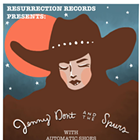Sevendust singer Lejon Witherspoon knows a few fans may grumble that his band failed to stay true to their heavy metal ethos by displaying a more melodic dimension and -- gasp - even including a ballad on their new album, Seasons.
Witherspoon had a message for those who might decry this shift in Sevendust's modus operandi.
"People can say whatever, but Sevendust is still one of the heaviest-hitting bands around," he asserts. "I just think it's foolish not to be able to do a ballad if you feel it, because at the end of the day, I don't care how hard and heavy you are, you're sad, you know what I mean? Sometimes you have to get those emotions out, and that's how we do it, through our songs. That's how we get our frustrations out as well."
The music on Seasons supports Witherspoon's assertions. It's true that Sevendust's grasp for melody has never been more obvious on tunes like "Separate," "Disgrace" and the title song. On "Broken Down," Sevendust employs programmed rhythms and shifts easily between ambient and anthemic rock. And yes, "Skeleton Song" inescapably qualifies as a ballad.
That said, Seasons is far from wimpy (as Spokane fans will have a chance to discover live next Tuesday night as the band opens for Staind at the Convention Center). It might not rock as relentlessly as the band's earlier output, but even the most melodic songs here pack plenty of punch. And songs such as "Enemy" (the first single) "Face to Face" and "Suffocate" have moments of full-on fury. The lyrics, too, display a broader emotional range and a measure of vulnerability that's rare in heavy music. The character in "Honesty" openly regrets his role in ruining a relationship. A similar sense of sadness and guilt weighs heavily in the song "Disgrace" ("Where's the repair for all the damage I've done?").
For Witherspoon, that emotional depth and range is partly a function of the growth of the individual band members and a decision to tone down some indulgences within the band.
"In the beginning we were young and Motley Crue'd up," he admits, acknowledging the role partying played in the band's lifestyle. "Everybody grows up and babies come into play and we realized that it's a really beautiful career and we can't mess this up."
Guitarist Clint Lowery, in particular, has openly discussed his decision to quit drinking. But Witherspoon said the band members' behavior never was out of control: "I don't really feel that way, but I just know it was time to change."
Arriving on the scene with a 1997 self-titled debut, the group toured relentlessly for nearly two years, building a strong grassroots following and slowly but surely selling enough albums - more than 500,000 - to earn the debut a gold certification. Not wanting to lose that momentum, the group banged out their second long-player, the 1999 release Home, in three months and went right back on the road for another two years.
After this grueling stretch of roadwork, the band returned to Atlanta with another gold record under its belt, but to their surprise (and disappointment) no money in the bank. The band members were broke, to the degree that, for a time, they entertained the notion of finding day jobs. Sevendust blamed their business team and cleaned house, changing not only their management, but their booking agent, business manager and lawyer.
The 2001 album Animosity marked the beginning of the band's evolution toward a more melodic sound that favored the soulful singing of Witherspoon over the screamfests that typified earlier work. It became Sevendust's third straight gold record -- a remarkable achievement for a band on an independent label (TVT). But considering groups that once opened for Sevendust - such as Staind and Nickelback - have gone on to enjoy multi-platinum success, Sevendust felt they were overdue for a similar breakthrough.
With a new album that Witherspoon considers the band's most realized effort to date, Sevendust feels ready for that turn in the spotlight.
"I really feel like everything is aligned perfectly. The planets are aligned," he says. "Once we started working (on Seasons) the magic was hitting. It was a great experience."
Payton Place -- Nicholas Payton is a rare bird, possessing not only a reverence for jazz history, but also a seemingly insatiable desire to push himself and the boundaries of expectation. His music transcends tidy categorization. Payton refuses to be placed in a box -- at least until he can completely redefine what that box sounds like. The versatile, Grammy Award-winning trumpeter makes a visit to Spokane this weekend to conduct a free clinic on Friday evening and for a concert with the Whitworth Jazz Ensemble at Whitworth's Cowles Auditorium on Saturday night.
Payton's New Orleans heritage -- he was raised there by supportive, musician parents -- figures prominently in his playing style and performance attitude. He received his first trumpet at age four. By the time he was 12, he had already impressed Wynton Marsalis and soon was working as a jazz trumpeter in the All-Star Jazz Band.
"It was just a bunch of kids," he says. "But we played around New Orleans and even at some jazz festivals in Europe."
He went on to attend and to graduate from the New Orleans Center for Creative Arts. His recording career took flight in 1995 with From This Moment. His original compositions include "Beginning of the End," "The Sleepwalker," and "Young Payton Blues."
His seventh and latest album, Sonic Trance, represents a radical departure from his earlier work, a shift from standard-style jazz to a sound rooted in electronic funk.
"I'm still playing jazz but from a perspective of a man of my age and experiences," explains Payton. "I knew after I recorded Dear Louis [a tribute to Louis Armstrong, recorded in 2001] that I was closing a chapter on the kind of records I wanted to make."
And so the excursion into brand-new territory. Sonic Trance with its electronic effects, wild improvisations and funk-based rhythms sounds contemporary precisely because the inspiration for it was drawn from modern times by a young man with keen interpretive skills and a willingness to take chances.
"Right now I am still developing," Payton says. "I'm just gathering all these ideas, all of these influences that I have had over the years and bringing them together. All of the musicians I love and respect, like Ornette Coleman, John Coltrane and Bill Evans, made statements that had not only personal relevance to their lives, but cultural relevancy to the times in which they lived. It was a significant for me to do a project that embodied that."
Payton will present the free clinic for students and the public on Friday evening at 5:15 pm in Whitworth's Music Building band room.
Unpackaged -- By the time he formed Cracker in 1990, mercurial singer/songwriter/guitarist David Lowery had already established a sterling name for himself in indie rock circles as the front man of Camper Van Beethoven, one of the most refreshingly bent American groups to emerge in the late-'80s music underground. Cracker represented a calculated move away from the CVB's freeform, trans-genre explorations of texture and theme toward a much more tempered and traditional (even "rootsy") sound. Yet for every disgruntled Camper turned off by Lowery's newfound sonic sobriety, there were thousands of new fans climbing on board, digging the smarts and accessibility of such catchy Cracker singles as "Teen Angst (What The World Needs Now)" from the band's 1992 eponymous debut and "Low" from 1993's Kerosene Hat.
Cracker is set to light up the stage at Fat Tuesday's Concert Hall on Wednesday night all ages-style. The band's latest album is called Countrysides, quite fittingly a collection comprised of eight feral covers of the band's favorite country tunes along with the acerbic Lowery-penned original "Ain't Gonna Suck Itself" (a hilarious jab at the band's former label, Virgin Records) as the icing on this drunken, free-wheeling cake. Maybe all it took was getting dumped (by Virgin) to reignite Lowery's sardonic fuse. If that's indeed the case, here's hoping Cracker never gets offered a big label deal again, and instead lives out its days as an independent entity, free from the yoke -- and quick with a joke.
The 18th Hole -- After eight years of successful touring and album-creation, Five Iron Frenzy, an eight-piece, horn-driven ska-rock combo from Denver is calling it quits. Frenzy is pulling up its tent stakes, as it were, and moving into another arena -- the arena of "real" life -- where its members hope to explore such comparatively mundane pleasures as college, marriage, family and a steady paycheck.
But before that happens, you'll find them crisscrossing the country giving fans a final frenzied dose on a 56-stop national tour with the typically cheeky title "Winners Never Quit." That tour brings the band one last time to Spokane for a post-ska meltdown with local compatriots, 10 Minutes Down, at Fat Tuesday's this Monday night.
In addition to the tour, the band has two new albums to pimp in these final days: Cheeses, which collects oddball novelty tunes the band has dabbled in over the years, and The End Is Near, a new, more thoughtful and measured studio effort.
Publication date: 11/06/03






















